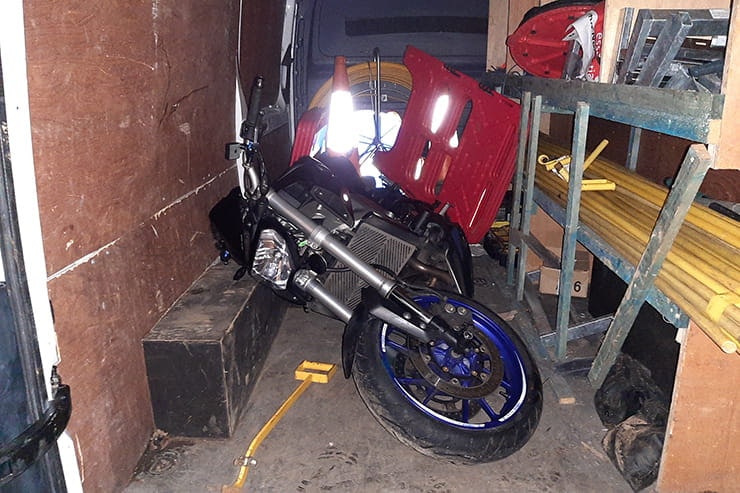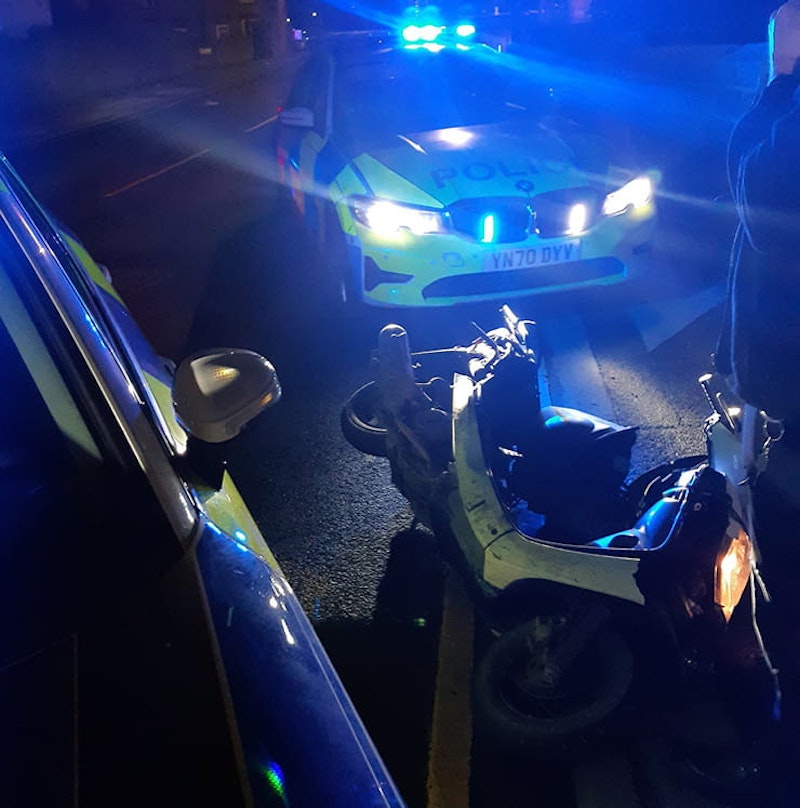What are the Police doing about motorcycle crime? | On the beat: January 2023
By Dave Yorke
Freelance journalist
31.01.2023
If you believe everything you read on social media, cops never respond to active reports of motorcycle theft anymore; “They only carry out easy policing like speed operations and targeting small reg plates.”
Right?
Wrong, read on to find out from an ex-police motorcycle sergeant what the cops did when they were allowed to police in January 2023…
Image from @ASPRoadSafety
Van carrying stolen motorcycle stopped
Avon and Somerset Police received a call from a member of the public at 2105 hrs to say their motorcycle had been stolen, and only 20 minutes later officers had stopped the van allegedly carrying the stolen bike in the back.
Five minutes later police had found the bike in the back of the van on the M49 – on its way to Wales – and arrested the three males with it.
This all sounds really simple but in reality, there’s a lot to consider if you’re the cop who gets behind the van on the motorway. First off, you’re probably going to be on your own and there’s three of them in the van so you’re going to have to get back-up in place before you attempt to stop it.
While you’re doing this, you’re going to have to formulate a plan to stop it. It’s not as easy as putting the blue lights on and then the van stops and three people, who have a stolen motorbike in the back of their van, jump out and say “Fair cop guv” as you slap the cuffs on them. You’ve only got one set of cuffs anyway.
What if it doesn’t stop and a pursuit starts? What if it stops and then reverse rams you? It’s a van, so bigger than whatever traffic car you’re driving. Or what if they get out and attack you?
These are all things that you must consider before you put the blue lights on. The police also recovered drugs in this stop along with the stolen bike, and had no idea of who or what they might have to face. A stolen bike in this case and a good job.
Image from @SYPOperations
Scooter-riding bike thieves arrested
Cops from South Yorkshire’s Police proactive Roads Policing Team responded to a call from a member of the public reporting an attempted theft, and on arrival spotted three males making off on a scooter, in a sort of modern-day Hair Bear Bunch sort of way.
After a short pursuit the police arrested two out of the three males on suspicion of theft. The scooter itself is suspected as being stolen and you can guess what the three males were trying to steal… that’s right, another motorcycle.
Roads Policing officers don’t just carry out speeding operations, they perform a vital role in denying criminals the use of the roads, supporting colleagues in operations to stop criminals from stealing motorbikes and ferrying drugs about. A bit like the Avon and Somerset job above really.
Images from Merseyside Police
Is one of these stolen bikes yours?
Still with the proactive theme this month, have you had an off-road bike stolen and can you identify one of these as yours? If so, Merseyside Police would like to hear from you after they executed a search warrant on a storage container where they found five off-road motorcycles that are suspected to be stolen and have been linked to anti-social behaviour in the area.
Executing a search warrant sounds like an easy job but the cops can’t just go to the warrant drawer at the station and get one out. They will have had to identify the location through community engagement and assess whether it’s credible information. Then they’ll have to attend a magistrate’s court and, under oath, convince a magistrate that the information is credible and what they’re hoping to find there. Only after that will they get a warrant issued by the court enabling them to go and search a premises, so it’s a bit more complicated than simply ‘executing a warrant’.
The term ‘suspected to be stolen’, doesn’t mean they are stolen, and unfortunately it’s really difficult for the police to find owners of off-road bikes. Also, as they’re unlikely to be insured the owners will have suffered financially as well.
Off-road bikes can frequently change hands and owners don’t always take a note of the frame and engine numbers, which means that even if you suspect a bike is yours, it’s difficult to claim it as such. Owners can register off-road motorcycles with the DVLA and get assigned a registration number – which they don’t have to display – and in doing so the police can trace a stolen bike back to its owner.
It’s also good to fit a property marking kit and make sure the kit’s registration details are correctly completed. When a suspected stolen bike gets recovered, it should get examined by the police and this will include UV scanning along with microchip scanning. It’s difficult for thieves to totally erase all of the markings, so it gives the police a chance to return a bike to its rightful owner.
Images from @_11ZERO3_
Criminal assists police in own arrest
With the police actively looking for criminals on the road, it helps them even more if riders who are up to no good actively identify themselves to make it that bit easier.
The rider of this Suzuki GSXR was wanted on a warrant after failing to appear at court. In order to assist the police, they popped some wheelies while speeding on their uninsured bike in front of the Metropolitan Police meaning they were able to be dealt with swiftly in Redbridge.
Images from @DC_NoExcuse
The quick way to lose your licence
Similarly, this rider decided to draw attention to themselves by riding without displaying L-plates and appearing – in the words of Devon and Cornwall Police – to nearly fall off on multiple occasions.
The technology employed in police vehicles these days, especially traffic cars, means the cops can check the reg of the bike they’re following and then check the insured riders’ details without stopping them. If the checks show the rider as a provisional licence holder only, then the cops will rightly wonder why there are no L-plates visible on the bike.
Riding without L-plates is an endorsable offence, meaning it brings penalty points along with a fine. The points range from 3-6 and the fine is £100.
The rider then tested positive for cannabis at the roadside, which after analysis is proved correct means those L-plate points will be going onto a disqualified driver’s licence.
It’s a minimum of a year’s ban for drug driving, and riding falls under the driving term.
Images from @MerpolSthSefton
Class-A drugs lead to off-road bike seizure
After stopping and searching a vehicle in Merseyside, cops found a quantity of class A drugs. A further search of an address linked to the incident led police to recover two off-road bikes. By ‘off-road bikes’ read motorbikes, as that’s what these are; they definitely aren’t e-bikes in the pedal cycle sense as they don’t have pedals.
Luckily, officers seized them as they can be quite quick once on the road and ridden dangerously like the one that Greater Manchester Police encountered.
Images from @gmptraffic
E-bikes are still motor vehicles
Spotted by a Police motorcyclist from the Commercial Vehicle Unit (CVU), the rider of this Surron decided against stopping, and a pursuit involving the police helicopter ensued that included the rider of the motorcycle finally being detained on the M602 motorway.
The rider was charged with dangerous driving, failing to stop, no driving licence and no insurance. If these sound like offences that relate to motor vehicles, then that’s because it’s exactly what these bikes are.
We started this month with cops being proactive and end it the same way. It doesn’t matter that a cop is from a roads policing unit, a commercial vehicle unit or a neighbourhood team, they are all out there denying criminals the use of the road.
Share on social media:

